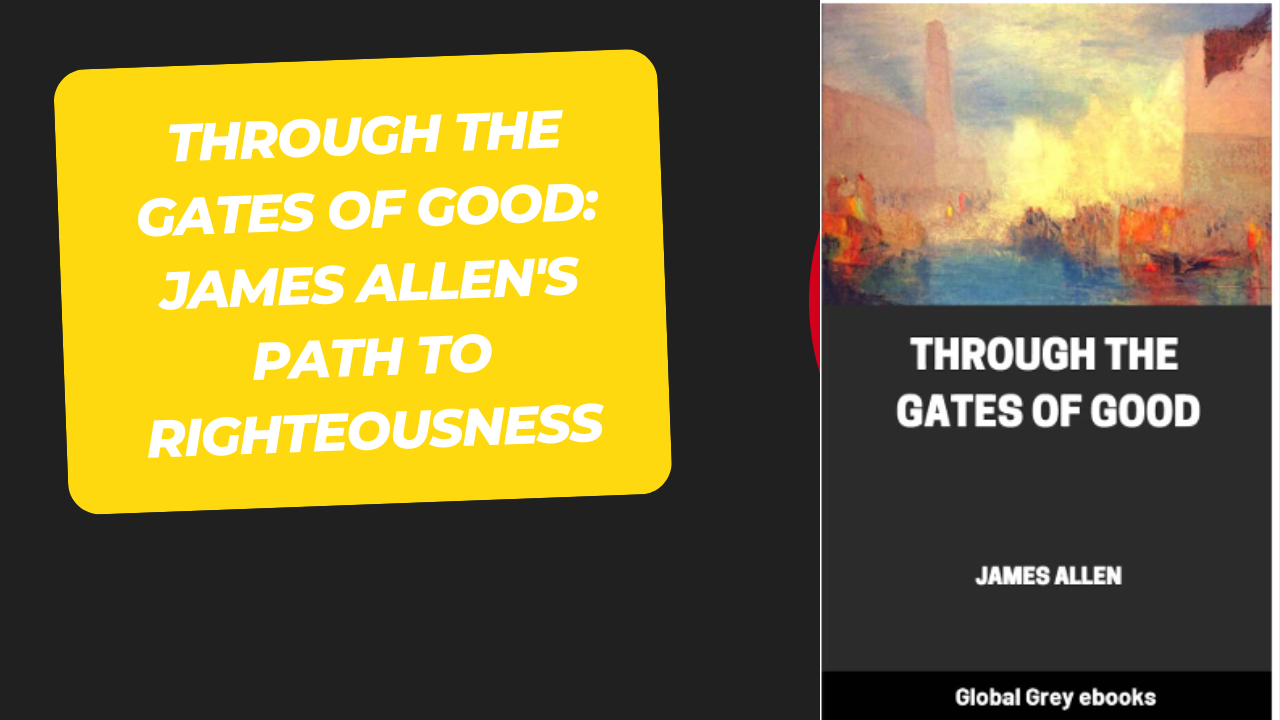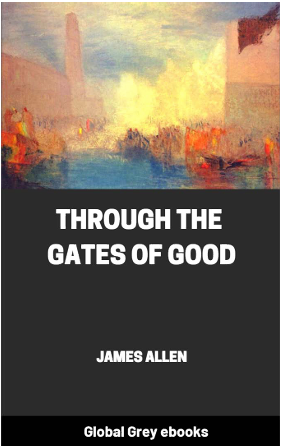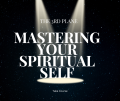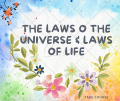
James Allen’s 1903 book, Through the Gates of Good, republished by Global Grey in 2019, explores the essence of spiritual truth through the lens of Jesus’ life and teachings, emphasizing simplicity and direct application in daily conduct. Allen argues that true religion lies in living a life of goodness, characterized by self-conquest, love, and blameless actions, rather than adherence to formal doctrines or theological debates. He asserts that humanity is inherently divine and that following Jesus’ precepts leads to inner transformation, spiritual enlightenment, and freedom from sin, ultimately revealing the “Kingdom of God” within. The book encourages readers to actively embody these principles to achieve genuine salvation and lasting peace.

Frequently Asked Questions about James Allen’s “Through the Gates of Good”
What is the central message of “Through the Gates of Good”?
The book emphasizes that true religion lies in the practice of goodness, which means striving for sinlessness through the purification of the heart and the building of a blameless life. It’s about living the teachings of Jesus, not merely adhering to doctrines or religious formalities. The key is self-conquest and manifesting divine love in thoughts, words, and deeds.
What does Allen mean by the “Gate of Good” and the “Way”?
The “Gate of Good” represents the entry into a life of righteousness, achieved through self-denial and renunciation of selfish desires. The “Way” is the narrow path of self-sacrifice, requiring constant vigilance against impure thoughts and actions. It’s a path accessible only to those who are willing to give up everything that opposes goodness.
How does Allen interpret Jesus’s role as a teacher?
Allen sees Jesus as the ultimate exemplar of sinless love and a practical teacher who taught others how to live. His authority comes not from speculation or theological theories, but from the consistent demonstration of divine qualities like meekness, compassion, forgiveness, and unending love in his life. The proof of his teaching is in his life and conduct.
What is Allen’s view on the importance of precepts or commands, particularly the “Golden Rule”?
Allen stresses that the precepts and commands of Jesus were given to be kept. The “Golden Rule” (“do unto others as you would have them do unto you”) is presented as the epitome of these teachings. Carrying out these precepts in one’s daily life is the whole duty of life and leads to the realization of one’s divine nature. The simple message has been lost because most people don’t believe it is possible to practice the teachings or aren’t willing to make the necessary sacrifices.
What does it mean to “love your enemies” according to Allen?
Loving your enemies isn’t about sentimental affection, but about rising above hatred and egotism. It requires removing all animosity, revenge, and judgment from the heart, and recognizing the Divine Principle of Love. This Love encompasses everyone and is practiced, not felt; by relinquishing one’s animal nature to the divine, one is able to act kindly irrespective of others’ attitudes.
What is the “yoke” and “burden” that Jesus speaks of, and why are they considered “easy” and “light”?
The “yoke” symbolizes obedience to one’s divine nature, choosing to follow higher desires, not lower impulses. The “burden” is living a sinless life. Allen argues that these are easy because they free us from the anxieties, fears, and sorrows caused by self-seeking and sin. True ease comes from aligning with our divine essence, whereas the burdens of sin are the true wearisome burdens of life.
What does Allen mean when he emphasizes “doing” over “saying” or “believing”?
Allen champions that the Gospel is one of “living and doing”. Actions and purified conduct are far more important than mere declarations of faith, religious observances, or adhering to theological theories. Truth is contained in conduct. He stresses that it is the doing of good deeds, the practice of righteousness, that brings peace and gladness, not simply the belief in those concepts.
What is the meaning of “salvation” in Allen’s interpretation?
Salvation, according to Allen, is not a future reward, but a present state of freedom from sin and the effects of sin, achieved through a complete change in conduct from selfishness to unselfishness, from evil to good. It’s about realizing the Kingdom of Heaven within oneself by banishing hellish desires and cultivating love and peace in one’s heart, resulting in freedom from strife.
Through the Gates of Good: A Study Guide
This study guide is designed to help you review and understand the key concepts presented in James Allen’s “Through the Gates of Good.” It includes a quiz, essay questions, and a glossary of terms.
Quiz
Answer the following questions in 2-3 sentences each.
- According to Allen, what is the supreme aim of all religions?
- What is the distinguishing feature of a True Teacher, according to Allen?
- What does Allen mean by “Goodness”?
- Why do people fail to carry out the precepts of Jesus, according to Allen?
- What does Allen mean by “the Law and the Prophets”?
- According to Allen, how does one comprehend the spiritual significance of a precept like “Resist not evil”?
- What is the “yoke” that Jesus speaks of, and why is it considered easy?
- Why does Allen think man has come to regard himself as native to sin?
- What qualities in the teaching of the Great Souls appeal to mankind?
- What is complete salvation according to Allen?
Quiz Answer Key
- The supreme aim of all religions is to teach men how to live. This involves the purification of the human heart, building a blameless life, and perfecting the soul, ultimately striving for and practicing Goodness.
- The distinguishing feature of a True Teacher is their life, which embodies their teaching. Their conduct is different from that of other men, and their teaching comes from their own life, not from books or other people.
- Allen means “sinlessness” when he speaks of Goodness. It is the beautiful and imperishable form of Religion, representing a state of moral purity and spiritual perfection.
- People fail to carry out the precepts of Jesus because they don’t believe it’s possible or are unwilling to make the personal sacrifices required. Unbelief and unwillingness to give up selfish desires hinder their ability to live out those teachings.
- Allen means that the entirety of spiritual life can be found in the commandment, “All things whatsoever ye would that men should do unto you, do ye even so unto them.” Understanding and practicing this one precept will lead to spiritual knowledge.
- One must assiduously practice the precept, “Resist not evil,” and not just rest content with dialectic definitions of it. One can only find its meaning by doing it.
- The “yoke” is obedience to the divine nature within, no longer obeying lower desires and impulses. It is considered “easy” because it entails no suffering, as it is relieved of the weight of sorrow, anxiety, and fear.
- Man has dwelt in the habitations of sin for so long, that he has come to regard himself as native to it, and as being cut off from the Divine Source. He thereby lost the consciousness and knowledge of his own divinity.
- The simple facts and truths of the soul and of life. Strictly speaking, the Great Souls bring to light and appeal directly to the soul and of life, they put forward no theory, advance no creed, lay no claim to any particular “views,” and propound no speculative philosophy.
- Complete salvation is freedom from sin. It is the freedom of old selfishness, the old life of self, in any or every shape. Only by turning to the new life of gentleness, and purity, and humility, and unselfish love, can a man be said to be saved from sin.
Essay Questions
Consider these questions and develop well-supported essays based on your understanding of the text.
- Discuss James Allen’s concept of “Goodness” as it relates to traditional religious practices. How does he differentiate between true religion and mere formalism?
- Analyze Allen’s interpretation of Jesus’ teachings, focusing on the practical application of his precepts in daily life. Provide examples from the text to support your analysis.
- Explore Allen’s view on the inherent divinity of humanity. How does this belief shape his understanding of sin, salvation, and the potential for personal transformation?
- Explain how, according to Allen, an individual can transition from a life of self-seeking to a life of divine love. What are the necessary steps and sacrifices involved?
- Examine Allen’s ideas about the relationship between the “Word” and the “Doer.” How does he argue that true understanding of spiritual principles comes from practice rather than intellectual assent?
Glossary of Key Terms
- Formalism: Adherence to outward forms and rituals without genuine inner transformation or spiritual understanding.
- Goodness: In this context, synonymous with sinlessness and moral purity. A state of being free from selfish desires and impure thoughts.
- Irreligion: The denial of Goodness; continuing to live in pride, condemnation, harshness, hatred, and anger.
- Precept: A rule or principle that should guide one’s conduct. In this context, refers to the teachings of Jesus.
- Renunciation: The act of giving up or sacrificing something valued, especially selfish desires and personal opinions, for a higher spiritual purpose.
- Salvation: Freedom from sin and its effects, achieved through personal transformation and the adoption of a life of Goodness.
- Self-Surrender: The complete giving up of one’s selfish will and desires to align with a higher power or divine principle.
- The Christ (Spirit): The spirit of Love, which is the abiding and indwelling Reality in man.
- True Teacher: One who knows the human heart and sees life as it is, always telling his questioner to go and do certain things rather than providing his own views.
- Universal Truth: The enduring and unchanging principles that underlie all existence. In this context, the majesty and splendor is as yet but dimly comprehended by mankind, but which must become the possession of all.






















0 responses on "Through the Gates of Good: James Allen's Path to Righteousness"